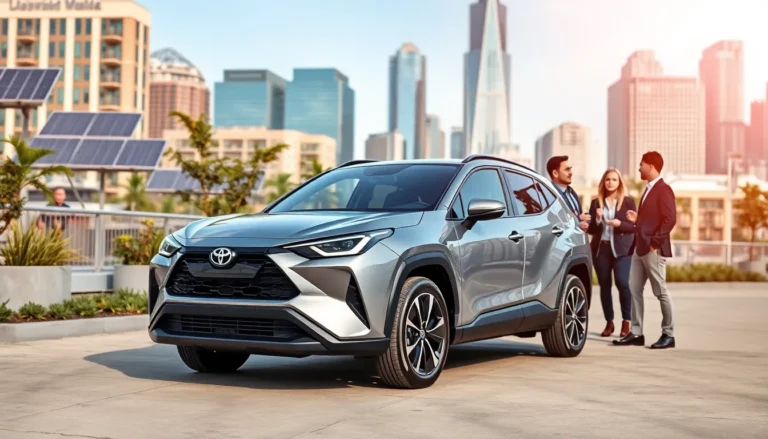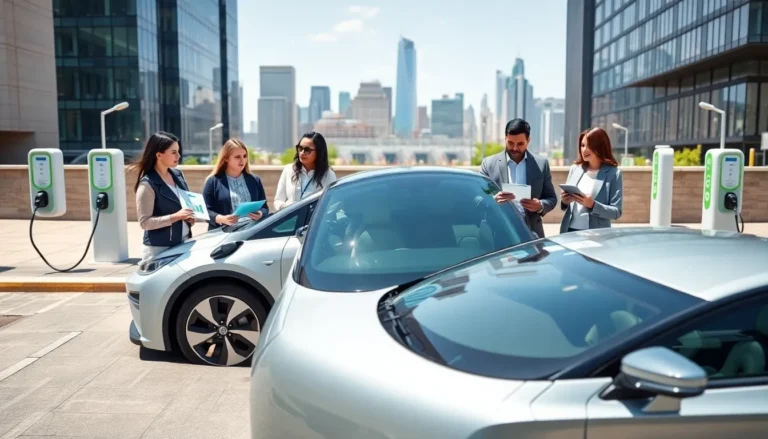Table of Contents
ToggleWhen you think of electric vehicles, you might not immediately think of Toyota. But that’s about to change. As traditional brands tread the path toward an electric future, Toyota is stepping up to lead the charge. With a mix of humor and a sprinkle of expertise, let’s jump into how Toyota is making waves in the electric vehicle market. Spoiler alert: it’s not just about saving the planet: it’s about driving the best cars you’ll ever own.
Overview of Toyota’s Electric Vehicle Strategy

Toyota has long been renowned for its innovation in the automotive world, and its electric vehicle strategy is no exception. In 2021, the company made a bold commitment to invest over $13 billion in electrification, signaling its serious intent to produce a variety of electric models. They plan to offer a diverse lineup of electric vehicles (EVs), hybrids, and plug-in hybrids. This multifaceted approach clearly showcases Toyota’s intention to lead the charge in zero-emission technology while accommodating different consumer preferences.
One of the cornerstones of Toyota’s strategy is its dedication to sustainability. They aim to achieve carbon neutrality by 2050, aligning with global efforts to combat climate change. With a history of pioneering hybrid technology, the company is now focusing on all-electric models that are both eco-friendly and economically viable. This shift isn’t just a momentary trend for Toyota: it is a strategic move based on market demand, technological advancements, and environmental considerations.
The Importance of Electric Vehicles in Today’s Market
The automotive landscape is shifting dramatically, with electric vehicles rapidly gaining market share. In 2021, EV sales surged by over 80%, and this trend shows no signs of slowing down. Consumers are becoming increasingly conscious about their carbon footprints, making electric vehicles a hot commodity. Governments, too, are incentivizing this shift through tax breaks and regulations that favor greener options.
Also, the urgency for cleaner alternatives has never been more palpable. With air quality concerns and fuel prices fluctuating like a yo-yo, electric vehicles are not just a choice: they’re a necessity. According to recent studies, the transition to electric mobility can save consumers money in the long run, offering lower maintenance costs and cheaper “fuel” with electricity.
Current Lineup of Toyota All Electric Vehicles
As of now, Toyota’s electric vehicle lineup includes the highly anticipated bZ4X, which exemplifies the brand’s commitment to innovation.
Key Features and Technologies
The bZ4X showcases cutting-edge technology with its all-wheel drive capability, ensuring it can traverse various terrains with ease. Also, Toyota employs its solid-state battery technology in developing next-generation batteries, promising quicker charging and greater durability. Smart technology features include an advanced infotainment system equipped with seamless smartphone integration and driver-assistance technologies that aim to enhance safety and convenience.
Battery and Charging Solutions
Charging solutions are a key aspect of Toyota’s electric vehicle lineup. The bZ4X supports fast-charging capabilities that can replenish up to 80% of the battery within just 30 minutes. Besides, Toyota is collaborating with various charging networks to ensure that EV owners have access to convenient charging stations, making long trips more feasible. It’s about turning a potential hassle into a breeze.
Safety and Reliability Standards
Safety is a cornerstone of Toyota’s philosophy, and its electric vehicles are no exception. The brand has established rigorous safety protocols that meet and exceed industry standards. The bZ4X undergoes extensive crash testing and incorporates numerous safety features, such as adaptive cruise control, lane-keeping assist, and pre-collision warnings.
Reliability is also a hallmark of Toyota vehicles. Their decades-long reputation for producing dependable cars means that consumers can trust the longevity and performance of their all-electric models. This commitment to safety and reliability not only builds customer confidence but also reinforces Toyota’s standing as a leader in the EV market.
Environmental Impact and Sustainability Initiatives
The environmental impact of electric vehicles cannot be overstated, and Toyota is deeply committed to reducing its carbon footprint. They focus on sustainable manufacturing processes, utilizing recycled materials in their EV production. Toyota strives to minimize waste and energy consumption in its operations.
Besides, the company is heavily investing in renewable energy sources, ensuring that the electricity powering its charging infrastructure comes from sustainable origins. This holistic approach to sustainability reinforces Toyota’s goal of not only producing electric vehicles but doing so responsibly and ethically.
Future of Toyota’s Electric Vehicle Development
The future looks bright for Toyota’s electric vehicle development. With ongoing investments in research and development, they are constantly exploring advancements in battery technology, autonomous driving features, and enhanced connectivity. The new releases under the bZ series are expected to roll out over the coming years, catering to a growing consumer demand for a wide variety of electric options.
Plus, partnerships with other tech companies are likely to proliferate, leading to innovative solutions that enhance vehicle performance and customer experience. Toyota is not resting on its laurels: instead, it is actively seeking to shape the future of electric mobility.







